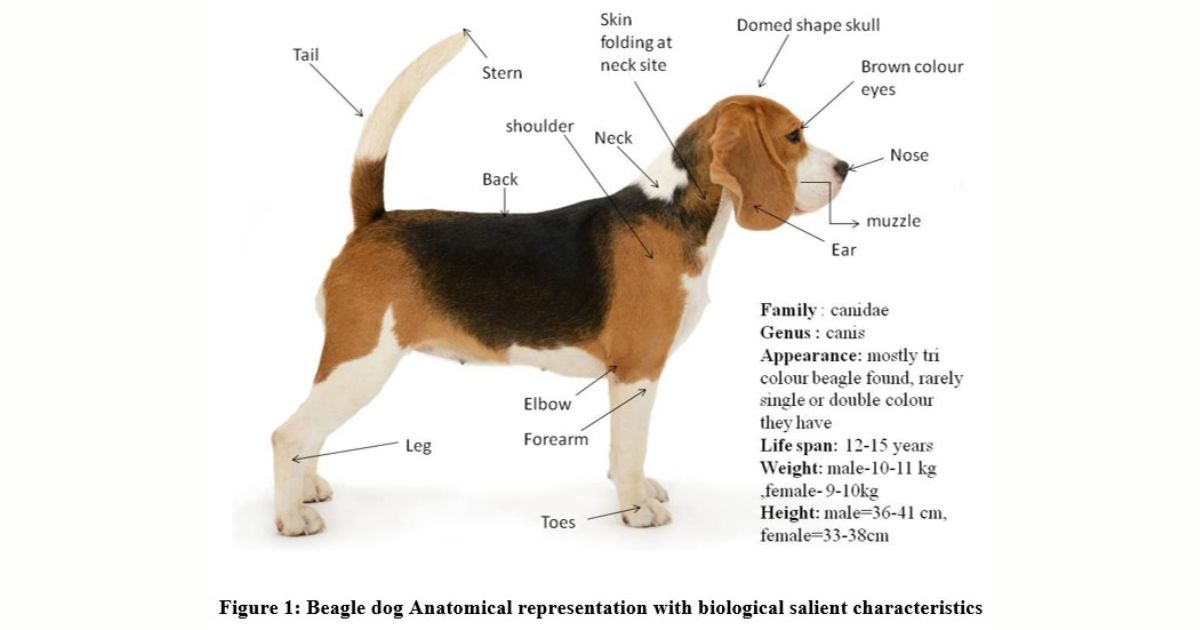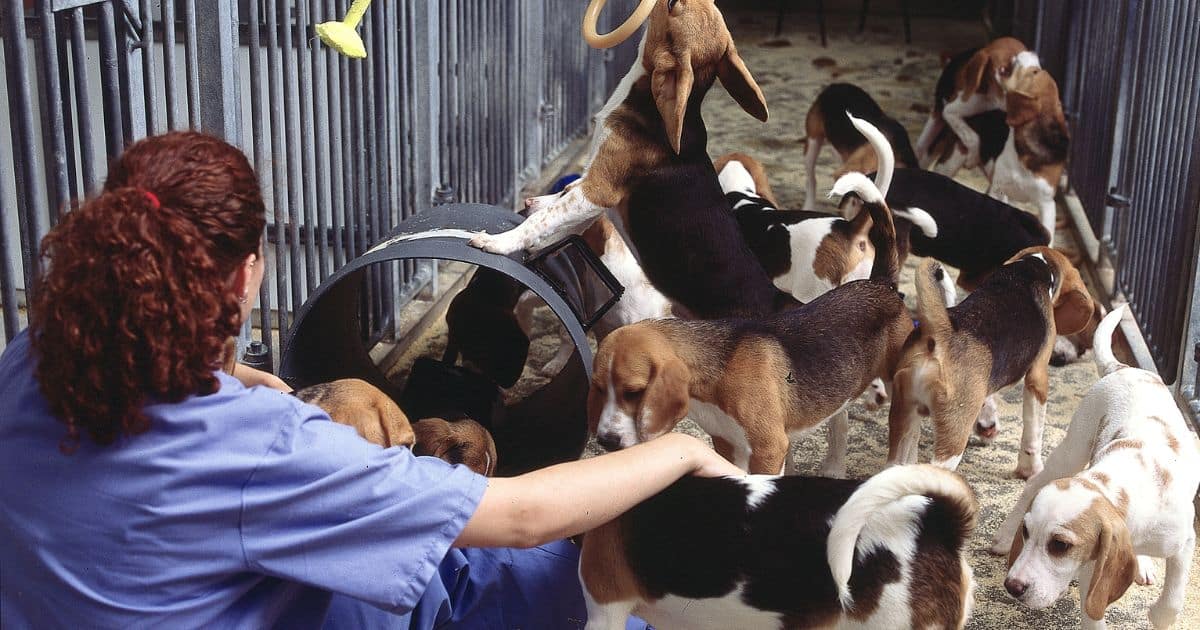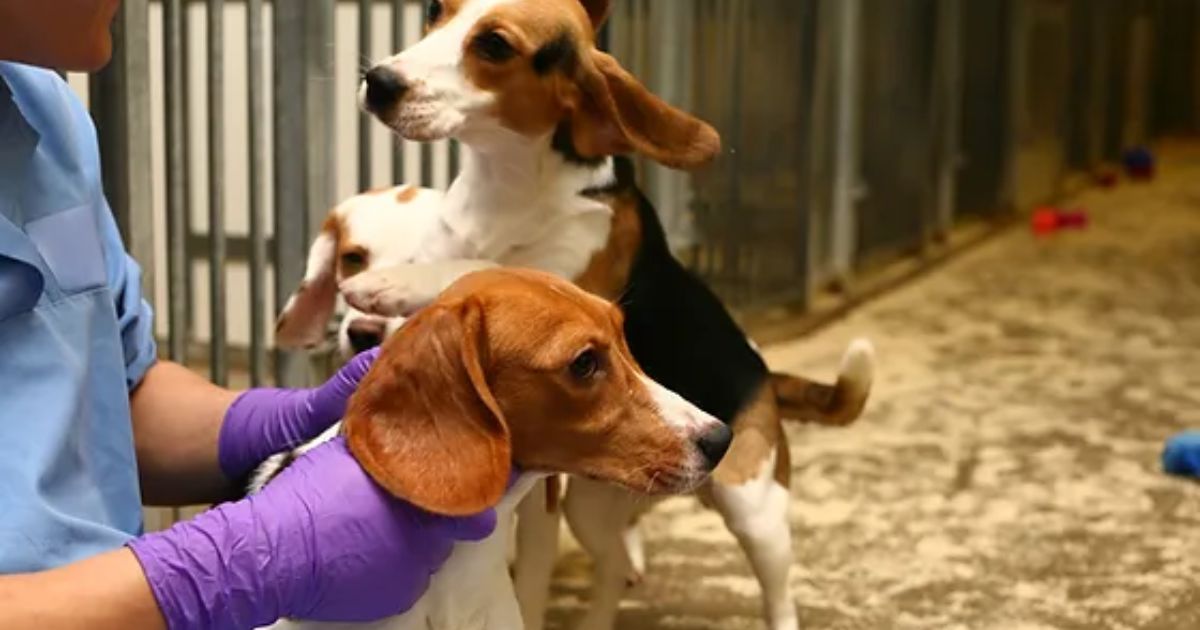In the pursuit of scientific progress, researchers often turn to the trusty companionship of beagles for medical research. These four-legged marvels possess unique characteristics that make them an ideal breed for such studies.
This article explores the role of beagles in advancing medicine, delving into the various types of research they are involved in and the products tested on them.
It also examines the regulations, ethics, and controversies surrounding beagle research, while considering alternatives and ensuring the welfare and care of these remarkable creatures.
Beagles: An Ideal Research Breed
Beagles possess characteristics that make them an ideal breed for medical research. Their small to medium size, docile nature, and adaptability make them well-suited for laboratory settings. Beagles are known for their friendly and sociable personalities, allowing them to easily interact with researchers and adapt to new environments.
Furthermore, their keen sense of smell and excellent tracking abilities make them invaluable in studies related to scent detection, such as cancer research and drug development. Beagles also have a relatively low incidence of genetic diseases, which ensures a more stable and reliable research population.
Their short hair and easy grooming requirements make them more manageable in a laboratory setting, reducing the risk of contamination and maintaining a hygienic environment. With these unique characteristics, beagles prove to be an indispensable breed for various medical research studies.
Unique Characteristics of Beagles for Medical Research

When considering their suitability for medical research, the unique characteristics of beagles make them an invaluable breed. Beagles are known for their friendly and docile nature, making them easy to handle and work with in laboratory settings. Additionally, their compact size and medium build allow for easy handling and transportation.
Beagles also possess a keen sense of smell, which is useful in detecting certain diseases or conditions. Furthermore, their relatively low incidence of genetic diseases and their ability to adapt to various environments make them a reliable and consistent research model.
Beagles are also known for their longevity, which is advantageous for long-term studies. Overall, these unique characteristics make beagles a preferred choice for medical research, allowing scientists to conduct experiments effectively and efficiently.
The Role of Beagles in Advancing Medicine
The use of beagles in medical research plays a crucial role in advancing medicine. Beagles possess unique characteristics that make them ideal for various types of studies, from toxicity testing to drug development. Here are three specific ways in which beagles contribute to medical advancements:
- Genetic similarity: Beagles share a high degree of genetic similarity with humans, making them valuable models for studying diseases and understanding their underlying mechanisms.
- Size and temperament: Beagles are medium-sized dogs with a friendly and docile temperament, which makes them easy to handle and work with in a laboratory setting. Their size also allows for practical considerations, such as housing and feeding.
- Lifespan and reproductive capacity: Beagles have a relatively long lifespan compared to other dog breeds, enabling researchers to conduct long-term studies. Additionally, they have a high reproductive capacity, allowing for the generation of large cohorts for statistical analysis.
Beagles in Different Types of Medical Research

One common application of these versatile canines is in various types of medical research. Beagles have proven to be valuable assets in advancing our understanding of human health and developing new treatments. Their unique traits, such as their small size, gentle temperament, and ease of handling, make them ideal candidates for medical research.
Beagles are commonly used in different types of medical research, including pharmacology, toxicology, and biomedical research. In pharmacology studies, beagles are used to test the safety and efficacy of new medications before they are approved for human use.
In toxicology research, these dogs are exposed to certain substances to understand their effects on the body. In biomedical research, beagles are used to study various diseases, such as cancer, cardiovascular diseases, and neurological disorders.
Their use in these types of research helps scientists gather valuable data that can lead to advancements in medicine and improve human health. The table below provides a summary of the different types of medical research where beagles are commonly utilized:
| Type of Medical Research | Description | Purpose |
|---|---|---|
| Pharmacology | Testing new medications for safety and efficacy | Develop safe and effective drugs for humans |
| Toxicology | Studying the effects of substances on the body | Understand the potential risks and hazards |
| Biomedical Research | Investigating diseases and potential treatments | Advance our understanding of diseases and develop new therapies |
Beagles play a crucial role in these types of medical research, offering insights that can ultimately improve the lives of humans. Their contributions in these areas demonstrate their value as research animals and highlight the importance of ethical and responsible use in scientific endeavors.
Products Tested on Beagles in Research
Beagles have been subjected to testing various products in medical research, including pharmaceuticals, chemicals, cosmetics, and household products. These tests aim to evaluate the safety and efficacy of these substances before they are used on humans. Here are three examples of products that are commonly tested on beagles in research:
- Pharmaceuticals: Beagles are often used to test the effectiveness and potential side effects of new drugs. This helps researchers determine the appropriate dosage and identify any potential risks before the drugs are administered to humans.
- Chemicals: Many industrial chemicals undergo testing on beagles to assess their toxicity levels and potential impact on human health. This information is crucial for regulatory agencies in setting safety guidelines and protecting public health.
- Cosmetics and household products: Beagles are sometimes used to evaluate the safety of cosmetic and household products, such as shampoos, cleaning agents, and pesticides. These tests help identify any potential irritants or harmful effects that these products may have on human skin or eyes.
Companies Involved in Beagle Testing
Several companies are actively involved in conducting beagle testing for medical research purposes. These companies play a crucial role in advancing scientific knowledge and developing new treatments and medications. Here are some of the prominent companies involved in beagle testing:
| Company Name | Description | Website |
|---|---|---|
| ABC Laboratories | A leading contract research organization (CRO) | www.abclabs.com |
| MedPharm | Specializes in topical and transdermal drug | www.medpharm.co.uk |
| Covance | Offers a broad range of drug development | www.covance.com |
| Charles River | Provides comprehensive research models and | www.criver.com |
| Laboratories | preclinical testing services |
These companies adhere to strict ethical guidelines and regulatory requirements to ensure the welfare and humane treatment of the animals involved in their research. Their work contributes to the advancement of medical science and the development of life-saving treatments.
Regulations and Ethics of Beagle Research

The regulations and ethical considerations surrounding beagle research are of paramount importance in ensuring the welfare and humane treatment of the animals involved. Beagles are commonly used in medical research due to their docile nature and size, but it is essential to establish guidelines and standards to protect their well-being. Here are three key aspects of the regulations and ethics governing beagle research:
- Animal Welfare: Strict regulations are in place to ensure that beagles used in research are treated humanely, with proper housing, nutrition, and veterinary care. Regular inspections are conducted to monitor their well-being and prevent any form of mistreatment.
- Replacement, Reduction, and Refinement: The 3Rs principle (Replace, Reduce, Refine) is applied to minimize the use of animals in research, improve experimental techniques, and enhance their welfare. Researchers are encouraged to explore alternative methods whenever possible.
- Ethical Review: Ethical committees review research proposals involving beagles to assess the scientific value, necessity, and potential harm to the animals. These committees ensure that only studies with significant benefits and minimal suffering are approved.
Alternatives to Beagle Testing
Moving beyond traditional beagle testing, researchers have been exploring alternative methods to minimize the use of animals in medical research. These alternatives aim to provide reliable results while reducing the ethical concerns and potential harm to animals.
One such alternative is in vitro testing, which involves conducting experiments on cell cultures or tissues in a controlled laboratory environment. This method allows researchers to study the effects of drugs or substances without the need for live animals.
Another alternative is computer simulation, where sophisticated models are used to simulate the biological processes in the human body. These simulations can help predict the effects of drugs and identify potential adverse reactions.
The use of human volunteers in clinical trials has become more common, as it provides more relevant data for human health. By embracing these alternatives, researchers are moving towards a more ethical and efficient approach to medical research.
Welfare and Care of Research Beagles
While conducting medical research, it is essential to prioritize the welfare and care of research beagles. These dogs play a crucial role in advancing scientific knowledge and improving human and animal health. To ensure their well-being, the following measures are typically taken:
- Housing and Environment: Beagles are provided with clean and comfortable housing, including spacious kennels that allow for natural behavior, exercise, and socialization.
- Veterinary Care: Regular veterinary check-ups, preventive treatments, and access to medical care are provided to maintain the health of research beagles.
- Enrichment Programs: Beagles are given mental and physical stimulation through enrichment activities, such as toys, puzzles, and social interaction, to promote their overall well-being.
These practices aim to ensure that research beagles are treated with compassion and respect, acknowledging their important contribution to scientific progress.
Transition: While efforts are made to prioritize the welfare of research beagles, controversies and protests surrounding beagle research have emerged. Let’s explore these concerns in the next section.
Controversies and Protests Surrounding Beagle Research
Controversies and protests have arisen concerning the use of beagles in medical research. Animal rights activists argue that subjecting beagles to experimentation is unethical and cruel. They claim that these dogs, known for their gentle and friendly nature, should not be subjected to invasive procedures and potentially harmful substances.
Critics argue that alternative methods, such as computer simulations and cell cultures, should be used instead of using live animals. In response to these concerns, some countries have implemented stricter regulations on animal research, including the use of beagles.
Additionally, organizations advocating for animal welfare have called for increased transparency and accountability in animal research, as well as promoting the development and use of alternative testing methods.
Despite these controversies, proponents of beagle research argue that it has contributed significantly to medical advancements and saving human lives. They emphasize the importance of balancing ethical considerations with the potential benefits of using beagles in medical research.
Conclusion
In conclusion, beagles have been widely used in medical research due to their unique characteristics that make them ideal for such studies. Their docile temperament, small size, and adaptability to various environments make them suitable for a wide range of experiments. Despite controversies surrounding their use, regulations and ethical guidelines are in place to ensure the welfare and care of research beagles.
As science continues to progress, it is important to explore and promote alternative testing methods that minimize the use of animals in research. In the grand scheme of advancing medicine, beagles have played a significant role.







